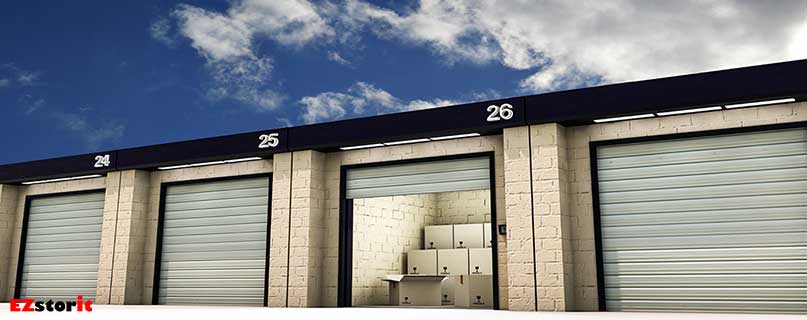Jul
06
Revolutionizing Self-Storage: Exploring the Future Innovations and Trends
06

In a world where space is increasingly at a premium, the self-storage industry has become a lifeline for countless individuals and businesses alike. But as technology continues to advance at an unprecedented pace, the future of self-storage is poised for a monumental transformation. From automated facilities to virtual inventory management systems, the industry is on the brink of a revolution that promises to redefine how we store our belongings.
In this article, we will take a closer look at the cutting-edge innovations and trends that are revolutionizing the self-storage landscape. We will explore how robotics and artificial intelligence are streamlining operations, how augmented reality is enhancing the customer experience, and how eco-friendly practices are shaping the industry's future.
Join us as we embark on a journey to uncover the exciting developments that are propelling self-storage into the future and discover how these advancements are changing the way we think about storing our possessions.
Evolution of Self-Storage
Self-storage has come a long way since its inception in the 1960s. Originally, self-storage units were simple, single-story buildings with minimal security features. They provided individuals and businesses with additional space to store their belongings, but the industry lacked sophistication and convenience. Over time, however, self-storage facilities began to evolve, offering a wider range of amenities and services to meet the growing demands of customers.
Today, self-storage facilities are equipped with state-of-the-art security systems, climate control options, and even on-site amenities such as packing supplies and moving services. The industry has embraced technology to enhance the customer experience and improve operational efficiency.
As we look toward the future, the evolution of self-storage is set to continue, driven by advancements in robotics, artificial intelligence, and other cutting-edge technologies that are transforming the way we think about storage.
Current Challenges in the Self-Storage Industry
While the self-storage industry has experienced significant growth and innovation, it also faces its fair share of challenges. One of the key challenges is the limited availability of prime real estate in densely populated areas. As urbanization continues to increase, finding suitable land for self-storage facilities becomes increasingly difficult, driving up the cost of construction and limiting the number of facilities that can be built.
Another challenge is the rising competition in the self-storage market. With the industry's rapid growth, new players are entering the market, leading to increased competition and the need for existing facilities to differentiate themselves. This has prompted industry leaders to focus on providing unique value propositions and leveraging technology to stay ahead of the competition.
Additionally, the self-storage industry faces the challenge of changing customer expectations. As consumers become more tech-savvy and accustomed to convenience, they expect self-storage facilities to offer seamless online booking systems, access controls, and other digital services. Meeting these expectations requires constant innovation and investment in technology.
Technological Advancements in Self-Storage
Technological advancements are at the forefront of revolutionizing the self-storage industry. These advancements enable self-storage facilities to operate more efficiently, enhance security measures, and provide customers with convenient, user-friendly experiences. One of the key technologies driving this revolution is the Internet of Things (IoT).
The IoT allows self-storage facilities to connect various devices and systems, creating a network of smart objects that can communicate and share data. This connectivity enables facility managers to monitor security systems, climate control, and other critical aspects remotely. For example, IoT sensors can detect temperature and humidity levels in storage units, ensuring that customers' belongings are stored in optimal conditions.
Automation and robotics will also transform the self-storage industry. Automated facilities equipped with robotic systems will be able to handle tasks such as inventory management, retrieval, and even packing and moving items. These systems will not only save time and labor costs but also minimize human error, ensuring efficient and accurate operations. Robotic technology will also enhance security measures, with autonomous surveillance drones and robotic guards patrolling the facilities.
Smart Self-Storage Facilities and Security Systems
Smart self-storage facilities are revolutionizing the industry by leveraging advanced technologies to enhance security, convenience, and operational efficiency. These facilities utilize state-of-the-art access control systems, allowing customers to securely access their storage units using their smartphones or other digital devices. Mobile apps and online platforms provide customers with real-time information about their units, including inventory management and billing details.
In addition to digital access control, smart self-storage facilities employ advanced security systems such as facial recognition, biometric authentication, and video surveillance. These technologies ensure that only authorized individuals can access the facility and provide an extra layer of protection for customers' belongings. Real-time monitoring and alerts enable facility managers to quickly respond to any security breaches or incidents.
Furthermore, smart facilities utilize data analytics to optimize operations and improve customer experiences. By analyzing customer behavior, facility managers can identify trends, optimize unit allocation, and personalize services based on individual preferences. This data-driven approach allows self-storage facilities to maximize space utilization and provide tailored solutions for customers.
Mobile Apps and Online Platforms for Self-Storage
The rise of mobile apps and online platforms has revolutionized various industries, and self-storage is no exception. These digital solutions offer convenience and flexibility to customers, allowing them to manage their storage units anytime, anywhere. Mobile apps provide customers with the ability to book units, pay bills, and access their belongings remotely. They also enable customers to schedule pick-ups and deliveries, making the process of storing and retrieving items hassle-free.
Online platforms serve as marketplaces for self-storage, connecting customers with available units and facilitating transactions. These platforms provide customers with a wide range of options, allowing them to compare prices, locations, and amenities before making a decision. Additionally, online platforms enable individuals and businesses to rent out their unused space, creating a sharing economy within the self-storage industry.
The integration of mobile apps and online platforms with smart self-storage facilities creates a seamless user experience. Customers can easily manage their storage needs, track their belongings, and receive notifications about important updates. These digital solutions not only improve convenience for customers but also streamline operations for facility managers.
Sustainable Practices in the Self-Storage Industry
As sustainability becomes a global priority, the self-storage industry is embracing eco-friendly practices to reduce its environmental impact. From energy-efficient facilities to recycling programs, self-storage operators are taking steps to promote sustainability and contribute to a greener future.
One of the key areas of focus is energy consumption. Self-storage facilities are implementing energy-efficient lighting systems, HVAC systems, and insulation to reduce energy waste. They are also exploring renewable energy sources such as solar panels to generate clean energy and minimize reliance on fossil fuels.
Another important aspect of sustainable self-storage is waste management. Facilities are implementing recycling programs to encourage customers to dispose of their unwanted items responsibly. They are also partnering with local organizations to donate or recycle items that are no longer needed. By promoting recycling and responsible waste management, self-storage facilities are minimizing their contribution to landfill waste.
Furthermore, sustainable self-storage facilities are incorporating sustainable materials and construction practices. From using recycled building materials to utilizing green building certifications, such as LEED (Leadership in Energy and Environmental Design), operators are prioritizing environmentally friendly construction methods.
Future Trends and Predictions in Self-Storage
The self-storage industry is poised for continued innovation and growth. Several trends and predictions are shaping the future of self-storage, offering exciting possibilities for both operators and customers.
One of the key trends is the integration of augmented reality (AR) into the self-storage experience. AR technology allows customers to visualize and plan their storage units before renting them. By overlaying digital images onto the physical space, customers can assess the suitability of a unit and determine if it meets their specific needs. This technology enhances the customer experience by providing a realistic preview and ensuring optimal space utilization.
Another trend is the development of self-storage facilities in urban areas with limited space. As land availability becomes scarcer, self-storage operators are exploring innovative solutions such as vertical storage facilities. These multi-level buildings maximize space utilization and provide convenient storage options in densely populated areas.
Additionally, the use of big data and predictive analytics is expected to play a significant role in the future of self-storage. By analyzing vast amounts of data, operators can anticipate customer demands, optimize pricing strategies, and tailor services to individual preferences. This data-driven approach enables operators to stay ahead of the competition and offer personalized solutions to customers.
Conclusion
The self-storage industry is undergoing a revolution driven by technological advancements, changing customer expectations, and a growing focus on sustainability. From automated facilities to smart access control systems, the future of self-storage promises enhanced convenience, security, and efficiency. As robotics, artificial intelligence, and other innovative technologies continue to evolve, the self storage industry will redefine the way we think about storing our possessions.
The integration of mobile apps and online platforms enables customers to manage their storage needs with ease, while sustainable practices contribute to a greener future. Looking ahead, augmented reality, vertical storage facilities, and data-driven insights will shape the future of self-storage, offering exciting possibilities for both operators and customers. The self-storage industry is on the cusp of a transformation, and by embracing these advancements, it will continue to revolutionize the way we store and access our belongings.
By: Lee Preston
Lee is the Director of Marketing and Promotion for EZstorit.com. When she is not working with our storage facilities partners, she is writing about topics that affect our daily lives.






